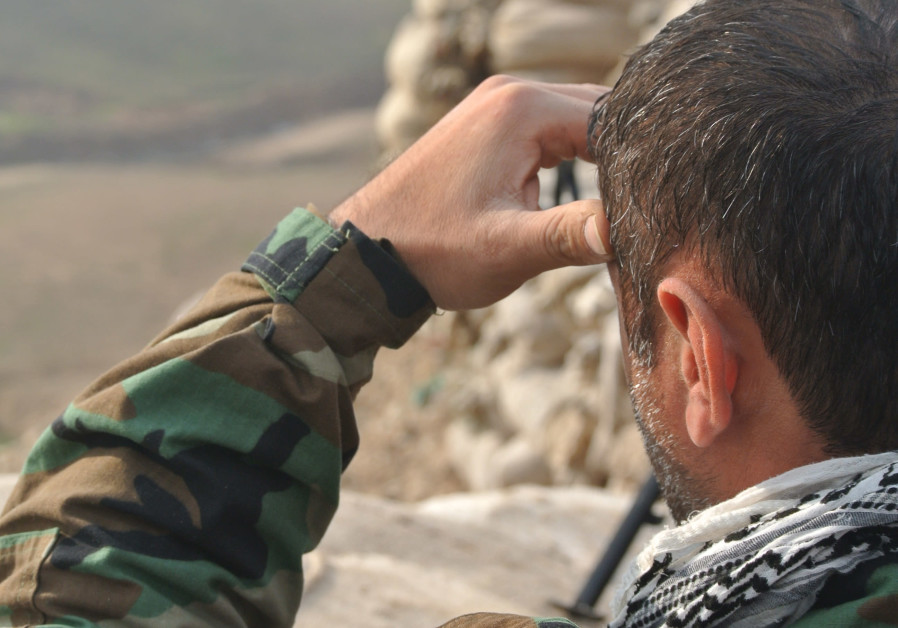Kurds who fought ISIS, now hunted by Iran’s regime

A PAK member looks out over a frontline during the war on ISIS in Iraq in 2016.. (photo credit: SETH J. FRANTZMAN)
“Malek was a great guy, he was always laughing. When I heard he had been killed I teared up. It gutted me,” recalls one of the men who served alongside Said Kazim Kalhur, known as “Malek” to his friends and comrades in the Kurdistan Freedom Party (PAK). The small group of dedicated fighters in the PAK played a key role in fighting ISIS at several frontlines held by Kurdish forces between 2014 and 2017. Now some of those veterans have been kidnapped and killed by Iran’s regime, members say.
Kurds who joined PAK are from Iran but fled the Islamic Republic’s repression, and found refuge in the autonomous Kurdistan Regional Government areas of northern Iraq. According to PAK, four of their members have been targeted by Tehran in the last month. Malek was poisoned. Arman Ghafouri, an environmentalist, was also tortured and killed. Two others had returned to Kurdish areas in Iran and were kidnapped by the regime, accused of supporting revolts and protests that have rocked Kurdish towns over the last months.
Malek’s story struck a cord with those who served with him at Bashiqa and later during the Mosul offensive in October 2016. They asked that their names not be used to protect their identity. “Malek hated ISIS. He hated what they stood for and represented. I remember one day during a firefight at Bashiqa he stood there cursing them.” Malek’s job was as a heavy machine gunner in the unit, and he drove the truck that the machine gun was mounted on. “He was a brave guy, a pure warrior.”
US: Iran misusing World Court with suit aimed at lifting sanctions, August 28, 2018 (Reuters)
According to a statement from the group, he had returned to western Iran to visit his family. “He was caught on March 3, and was taken by the Ettela’at [intelligence services]. After many sessions of questions and a series of torture, he did not share any information and was not ready to work with the regime.” Eventually he was served a cup of water that was poisoned. “On August 9, two other PAK members were on their way to rescue a wounded Peshmerga from PAK near Saqqez.” According to the statement they were caught by the Islamic Revolutionary Guard Corps (IRGC).
In recent months numerous Kurdish groups, and average people throughout Iran, have increased protests against the regime. This comes in the context of protests that broke out in December 2017 and also increasing US sanctions. Across Iran a variety of economic factors as well as anger over suppression of minority groups such as the Kurds, have caused protests. The IRGC has targeted Kurdish groups that it views as a threat. The PAK says that it members have been targeted because they were well trained during the years of the war on ISIS and had been preparing to return to confront the regime in Iran. The PAK also fought Iranian-backed Shia militias in Iraq in clashes near Prde (Altun Kupri) on the road between Kirkuk and Erbil in October 2017. PAK’s commander Hussein Yazdanpanah has been outspoken in his opposition to the role of Iranian-backed Shia militias in Iraq and also Iran’s theocratic regime, which he and other PAK members see as linked. Tehran also views the PAK as a threat inside Iran. “We are not in the mountains. We are inside the cities, and people see that. We have gained the people’s hearts.”
Join Jerusalem Post Premium Plus now for just $5 and upgrade your experience with an ads-free website and exclusive content. Click here>>






Comments are closed.